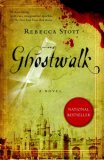Summary | Excerpt | Reading Guide | Reviews | Readalikes | Genres & Themes | Author Bio

I’ve always wondered how the two stories—the ragged one I put together in answer
to Cuff’s questions and the one I wrote in Kit’s study for Patricia Dibb—ended
up being so different. It wasn’t as if I falsified anything. For the police my
story was only part of a much bigger narrative, made up of perhaps twenty
witness accounts, so the prosecution knitted together all those reports and
circumstantial evidence in chronological order, and bit by bit against and
between them, my story got pulled in several directions. When set together with
all those others, my story took on a different shape, and it was the composite
version, filtered, dragged, and kneaded, that the jury agreed to. It was pretty
damning once they'd finished with it, damning enough to convict Lily Ridler of
murder and send her to prison for the rest of her life. A tight story, she said
to me the last time I saw her. Impenetrable now. A closed case.
The story kept on changing. When the court issued a press statement and the
newspapers distilled it back down to the size they wanted, with all the
appropriately dramatic, suspenseful moments, it fitted neatly into columns of
small type. One journalist even made a time line of events in which the two
murders were simply a notch in the straight passing of time through Lily’s life,
like a single–track train with stations that began with her birth and ended with
her arrest. She was charged with three murders and sixteen acts of unlawful
animal killing and mutilation, but because they couldn’t pin Elizabeth’s death
on her, she was convicted of only two murders. Once they’d added those killings
to the time line and filled in the details about her grandfather and her
parents, Lily Ridler had become a psychopath, a monster. Now, nearly two years
later, Lily is dead.
So if we thought it was finished, we know it isn’t now. The ghosts have not been
laid to rest after all, you see, not yours and not hers. If they were to
question me again I think I would have to say that I see it differently now—the
connections, I mean. Time does that. There were missing parts then, a historical
dimension that no one asked any questions about and which, then, I could only
half see.
What was missing? The seventeenth century. But how do you say that to a
policeman who has just switched on his tape recorder to record the words
“Parkside Police Station, 16 January, 2003, interview with Dr. Lydia Brooke”?
How do you say, “There’s a missing witness account and a missing
suspect…Sergeant Cuff, the seventeenth century is missing. And you need to talk
to a man called Mr. F.”
How do you tell him that you think there’s a link between a female scholar found
drowned in a river in Cambridge and a man who fell down a staircase nearby three
hundred years earlier? Not a simple causal relationship but something as
delicate as a web, one of those fine white skeins you see around the tips of
grass stems in the spring when the dew is heavy.
A crow has just flown off my study roof, launched itself into the air to my left
down over the garden, just as the right–hand corner of my map of Cambridge has
curled itself noisily away from the wall. The syncopated sounds of the scurrying
of crow’s feet on roof tiles and the curling of old paper is enough to make one
think that there might be something else in the room beside me as I write. Which
of you restless people is it? What do you want with my story?
No. If Elizabeth were here she would say that history is less like a skein of
silk and more like a palimpsest—time layered upon time so that one buried layer
leaks into the one above. Or like a stain in an old stone wall that seeps
through the plaster.
What would Cuff have said or done if I had told him that he needed to know about
the man who fell down the stairs of Trinity College on the 5th of January 1665,
the fall that stained the floor, the stain that leaked through Elizabeth’s life
and Lily’s, that held us all together, in thrall? Cuff would not have known the
significance of the date—1665—or at least I don’t think he would have done.
Perhaps 1666 would have rung some bells: the year the Great Plague abated in
England and the Fire of London ravaged the capital in its wake. He might have
remembered that from his secondary school history classes.
Excerpted from Ghostwalk by Rebecca Stott Copyright © 2007 by Rebecca Stott. Excerpted by permission of Spiegel & Grau, a division of Random House, Inc. All rights reserved. No part of this excerpt may be reproduced or reprinted without permission in writing from the publisher.




All my major works have been written in prison...
Click Here to find out who said this, as well as discovering other famous literary quotes!
Your guide toexceptional books
BookBrowse seeks out and recommends the best in contemporary fiction and nonfiction—books that not only engage and entertain but also deepen our understanding of ourselves and the world around us.